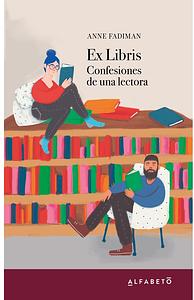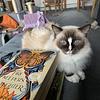Take a photo of a barcode or cover
inspiring
lighthearted
Essays about reading and books. Great read for bookworms.
funny
informative
lighthearted
relaxing
medium-paced
Collection of essays about books, authors and reading. Most of the authors and books mentioned I had never read, and some I had never heard of before. I skimmed parts of the book because I found it boring and over my head.
informative
inspiring
lighthearted
medium-paced
informative
relaxing
fast-paced
One of my favorite little books, this collection of essays from the Library of Congress's now-defunct Civilization magazine burbles with Fadiman's love of books, words, and whimsy. From the humor of combining book collections (and organizational styles) with her husband to the luscious delights of food in literature -- with a swing through the self-deprecating confessions of an obsessive proofreader -- Fadiman shares memories, musings, and mischief in equal parts. A true pleasure!
This ‘book on books’ just didn’t work for me. The chapters (or really, essays) were written over an extended period of time and I feel like that shows. The first half was not my favorite. I thought the flow of the second half was better - and particularly liked the essay on plagiarism. But it wasn’t my favorite read.
These essays covered a number of book-related topics that I'm interested in - how to care for a book, arranging books on a shelf, vocabulary, plagiarism, etc. My favorite essay was "My Odd Shelf," about readers' collections of books on their pet topics, whether it be Arctic exploration, pornography or the Han Dynasty.
For me the weakness of the book was the author's light touch, her upbeat, pleased-with-herself voice. She asks you to feel fondly about her literary family, frequently referring to them and herself in the third person plural as The Fadimans, or Fadiman U. (as in university).
My admiration of modesty means I have an aversion to making presumptions, no matter how deserved. Thus the opening passage of the essay "You are There" and others like it put me off for their love-me cockiness and their down-homey language (the peas):
"On November 12, 1838. Thomas Babington Macaulay set out by horse-drawn coach from Florence to Rome. 'My journey lay over the field of Thrasymenus,' he wrote in his journal, 'and as soon as the sun rose, I read Livy's description of the scene.'
The moment I read that sentence, I knew that Macaulay and I were peas in a pod."
For me the weakness of the book was the author's light touch, her upbeat, pleased-with-herself voice. She asks you to feel fondly about her literary family, frequently referring to them and herself in the third person plural as The Fadimans, or Fadiman U. (as in university).
My admiration of modesty means I have an aversion to making presumptions, no matter how deserved. Thus the opening passage of the essay "You are There" and others like it put me off for their love-me cockiness and their down-homey language (the peas):
"On November 12, 1838. Thomas Babington Macaulay set out by horse-drawn coach from Florence to Rome. 'My journey lay over the field of Thrasymenus,' he wrote in his journal, 'and as soon as the sun rose, I read Livy's description of the scene.'
The moment I read that sentence, I knew that Macaulay and I were peas in a pod."


